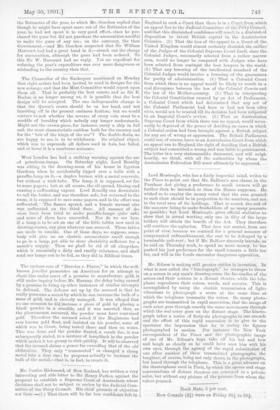Mr. Justice Richmond, of New Zealand, has written a very
interesting and able letter to Sir Henry Parkes, against the proposal to establish a Supreme Court of Australasia whose decisions shall not be subject to review by the Judicial Com- raittee of the Privy Council. His chief grounds of objection
ale these That-there will be far less confidence felt in England in such a Court than there is in a Court from which an appeal lies to the Judicial Committee of the Privy Council, and that this diminished confidence will result in. a diminished disposition to invest British capital in the Australasian Colonies. (2.) That the loss of the appeal to a Court of the United Kingdom would almost certainly diminish the calibre of the Judges of the Colonial Supreme Court itself, since the Colonial Judges, necessarily selected from a rather narrow area, would no longer be compared with Judges who have been selected from amongst the best lawyers in the world. (3.) That any lowering of the intellectual standard of the Colonial Judges would involve a lowering of the guarantees for purity of administration. (4.) That a Colonial Court from which there is no appeal would' be likely to result in a real divergence between the law of the Colonial Courts and the law of the Mother-country. (5.) That in interpreting the Colonial Constitution created by an Act of Parliament, a Colonial Court which had determined that any act of the Colonial Parliament had been or had not been ultra sires, would not be trusted till its decision had been subjected to an Imperial Court's review. (6.) That an Australasian. Supreme Court from which there was no appeal, would neces- sarily be deprived of the power of deciding on eases in which a Colonial action had been brought against a British subject for any act of wrong or oppression. The British Parliament could not, of course, leave to an Australasian Court from which no appeal ran to England, the right of deciding that a British subject had committed a wrong and was liable to punishment. The letter is a very statesmanlike document, and will weigh heavily, we think, with all the authorities by whom the Australasian Federation Bill must ultimately be approved.






































 Previous page
Previous page